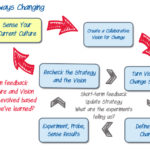(Continued from Agile Change or Adoption Always Starts with Why: Part 1, Part 2) Sense Your Current Culture To understand the culture you’re attempting to change in your organization, you need to measure (or sense) the current state and then map that state to a model. The model we will use is the Schneider Culture Model.[1] [2] […]
Organizational Improvement
Agile Change or Adoption: the Steps to Go from “Why” to “How”
(Continued from Agile Change or Adoption Always Starts with Why) If you’re going to become an Agile Organization, and you understand that it has to be a collaborative discussion and effort rather than an executive decree, here are the key ingredients to move forward with that decision effectively: Sense Your Current Culture Be mindful of the […]
Agile Change or Adoption Always Starts with Why
Your organization has decided to become more “Agile.” Why? As we learned in a previous blog post, “Because Our Competitors Are” is not a valid – or sensible – reason. Before embarking on a change, adoption, or improvement program, you need to know the rationale behind that decision. So… why Agile? A traditional approach to […]
Bell Curves and Measuring Badly
False Assumptions and Cognitive Biases To keep life manageable, and so we don’t run out of steam before we leave the house in the morning, we develop a series of mental shortcuts, aka habits. Habits aren’t only things like brushing our teeth and locking the front door, but also include our route to work and […]
Simplicity
In 201x, the global financial markets collapsed. Reason: mortgages were given to people who couldn’t afford them. This debt was then repackaged and sold to banks and other institutions as good debt. (“The Big Short” by Michael Lewis is an excellent indictment of this time). However, the bigger question remained. Why didn’t the financial regulator […]
“Because Our Competitors Are” is No Reason to Become an Agile Organization
Companies are starting to fall into a trap, and it goes something like this, “Our partners/competitors/… are Agile, so we need to be Agile.” Becoming Agile without a valid reason will harm your organization. I can’t state that any simpler. In the ‘80s and ‘90s, rival manufacturers often visited Toyota plants, and Toyota was delighted […]
Taking Organizational Improvement Seriously – Case Study
(Presented as an accompanying case study to Part 4 in the Scrum Alone is Not Enough series.) In the previous post, we discussed how it’s not enough to practice Scrum at the Team level and expect that it will solve all problems. Senior Management has to get involved for real Agile change to happen and […]
Taking Organizational Improvement with Scrum Seriously
(Presented as Part 4 in the Scrum Alone is Not Enough series, and accompanied by this worked example of Organizational Improvement in WorldsSmallestOnlineBookstore.) If Agile change initiatives don’t produce at least the doubling in productivity that is possible, it’s often because Scrum is used as a wrapper around the current state of work, but the organization […]


